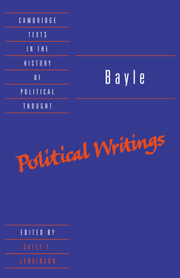Book contents
- Frontmatter
- Contents
- Acknowledgements
- A note on the translation
- List of abbreviations
- Introduction: a defence of justice and freedom
- Chronology
- Bibliography
- From Bayle's Dictionnaire historique et critique
- Project for a Critical Dictionary
- From Bayle's Dictionnaire historique et critique Bodin
- Brutus
- David
- Elizabeth
- Gregory
- Hobbes
- De l'Hôpital
- Hotman
- Japan
- Juno
- Loyola
- Machiavelli
- Mâcon
- Mariana
- Navarre
- Nicole
- Ovid
- Sainctes
- Sainte-Aldegonde
- Socinus (Marianus)
- Socinus (Faustus)
- Synergists
- Xenophanes
- Clarifications: On Atheists and On Obscenities
- Index
- Cambridge Texts in the History of Political Thought
Hotman
Published online by Cambridge University Press: 05 June 2012
- Frontmatter
- Contents
- Acknowledgements
- A note on the translation
- List of abbreviations
- Introduction: a defence of justice and freedom
- Chronology
- Bibliography
- From Bayle's Dictionnaire historique et critique
- Project for a Critical Dictionary
- From Bayle's Dictionnaire historique et critique Bodin
- Brutus
- David
- Elizabeth
- Gregory
- Hobbes
- De l'Hôpital
- Hotman
- Japan
- Juno
- Loyola
- Machiavelli
- Mâcon
- Mariana
- Navarre
- Nicole
- Ovid
- Sainctes
- Sainte-Aldegonde
- Socinus (Marianus)
- Socinus (Faustus)
- Synergists
- Xenophanes
- Clarifications: On Atheists and On Obscenities
- Index
- Cambridge Texts in the History of Political Thought
Summary
[After the English Revolution of 1688, and the outbreak of war between William III and Louis XIV, Huguenots in the Netherlands were torn between loyalty to their native land and loyalty to their adopted republic. Some, such as Jurieu, wrote in favour of William, Protestantism, and popular sovereignty, while others stayed silent. In his account of the Huguenot author of the Franco-Gallia, Bayle reveals another strategy. He reminds contemporaries that in the sixteenth century Protestants and Catholics had taught, in turn, that peoples were sovereign. For some doctrines were like ‘birds of passage’ – in ‘one country in summer’ and in another ‘in winter’. In 1673, Hotman had proposed an elected ruler as an alternative to the Catholic regency; but the elective argument had ‘migrated’ to the Catholic House of Guise in 1584 when the Protestant Henry of Navarre acceded as legitimate heir.]
Hotmanus (François) … was one of the most learned lawyers of the sixteenth century. He was born in Paris on 23 August 1524 … [(A)] As soon as he was fifteen he was sent to Orléans to study law … His father, a counsellor in the parlement who had already planned his career, brought him back and entered him for the bar; but the young man was soon repelled by the wrangling of the courts, and immersed himself in the study of Roman law and the humanities.
- Type
- Chapter
- Information
- Bayle: Political Writings , pp. 118 - 127Publisher: Cambridge University PressPrint publication year: 2000



